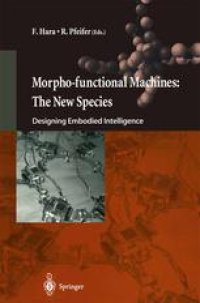
Ebook: Morpho-functional Machines: The New Species: Designing Embodied Intelligence
- Tags: Artificial Intelligence (incl. Robotics)
- Year: 2003
- Publisher: Springer Tokyo
- Edition: 1
- Language: English
- pdf
Morpho-functional Machines are a set of tools for investigating the design of embodied intelligence in autonomous bio-artifact systems. The focus in Morpho-functional Machines is on the balance of morphology, materials, and control; intelligent behavior emerges from the interaction of an autonomous system with a real-world environment. How, then, should body morphology, body materials, and sensory systems be designed to achieve a certain set of tasks or desired behaviors in a particular environment? This and other questions were addressed at the International Workshop on Morpho-functional Machines held in Tokyo in 2001. Collected here are the revised papers from the workshop, providing a new perspective for understanding embodied intelligence. Presenting the innovative concept of Morpho-functional Machines, this book is a valuable source for scientists and engineers working in ethnology, cognitive sciences, robotic engineering, and artificial intelligence.
Morpho-functional Machines are a set of tools for investigating the design of embodied intelligence in autonomous bio-artifact systems. The focus in Morpho-functional Machines is on the balance of morphology, materials, and control; intelligent behavior emerges from the interaction of an autonomous system with a real-world environment. How, then, should body morphology, body materials, and sensory systems be designed to achieve a certain set of tasks or desired behaviors in a particular environment? This and other questions were addressed at the International Workshop on Morpho-functional Machines held in Tokyo in 2001. Collected here are the revised papers from the workshop, providing a new perspective for understanding embodied intelligence. Presenting the innovative concept of Morpho-functional Machines, this book is a valuable source for scientists and engineers working in ethnology, cognitive sciences, robotic engineering, and artificial intelligence.
Morpho-functional Machines are a set of tools for investigating the design of embodied intelligence in autonomous bio-artifact systems. The focus in Morpho-functional Machines is on the balance of morphology, materials, and control; intelligent behavior emerges from the interaction of an autonomous system with a real-world environment. How, then, should body morphology, body materials, and sensory systems be designed to achieve a certain set of tasks or desired behaviors in a particular environment? This and other questions were addressed at the International Workshop on Morpho-functional Machines held in Tokyo in 2001. Collected here are the revised papers from the workshop, providing a new perspective for understanding embodied intelligence. Presenting the innovative concept of Morpho-functional Machines, this book is a valuable source for scientists and engineers working in ethnology, cognitive sciences, robotic engineering, and artificial intelligence.
Content:
Front Matter....Pages I-XI
Morpho-functional Machines: Basics and Research Issues....Pages 1-21
Deployable Structures in Biology....Pages 23-40
Evolving Task Specific Optimal Morphologies for an Artificial Insect Eye....Pages 41-57
Co-evolving Control and Morphology with LEGO Robots....Pages 59-79
Facilitating Controller Evolution in Morpho-functional Machines — A Bipedal Case Study....Pages 81-98
Amoeba-like Robots in the Perspective of Control Architecture and Morphology/Materials....Pages 99-129
A Skeletal Framework Artificial Hand Actuated by Pneumatic Artificial Muscles....Pages 131-143
Face Robot — Soft Material and Multiple Actuation for Facial Expressions....Pages 145-165
Homogeneous Distributed Mechanical Systems....Pages 167-193
Emerging of Group Formation — Morphological Configuration of Multi-Robot System —....Pages 195-215
Evolving Morphologies and Neural Controllers Based on the Same Underlying Principle: Specific Ligand-Receptor Interactions....Pages 217-236
Evolving Complete Agents using Artificial Ontogeny....Pages 237-258
Design Principles of Morpho-functional Machines....Pages 259-286
Morpho-functional Machines are a set of tools for investigating the design of embodied intelligence in autonomous bio-artifact systems. The focus in Morpho-functional Machines is on the balance of morphology, materials, and control; intelligent behavior emerges from the interaction of an autonomous system with a real-world environment. How, then, should body morphology, body materials, and sensory systems be designed to achieve a certain set of tasks or desired behaviors in a particular environment? This and other questions were addressed at the International Workshop on Morpho-functional Machines held in Tokyo in 2001. Collected here are the revised papers from the workshop, providing a new perspective for understanding embodied intelligence. Presenting the innovative concept of Morpho-functional Machines, this book is a valuable source for scientists and engineers working in ethnology, cognitive sciences, robotic engineering, and artificial intelligence.
Content:
Front Matter....Pages I-XI
Morpho-functional Machines: Basics and Research Issues....Pages 1-21
Deployable Structures in Biology....Pages 23-40
Evolving Task Specific Optimal Morphologies for an Artificial Insect Eye....Pages 41-57
Co-evolving Control and Morphology with LEGO Robots....Pages 59-79
Facilitating Controller Evolution in Morpho-functional Machines — A Bipedal Case Study....Pages 81-98
Amoeba-like Robots in the Perspective of Control Architecture and Morphology/Materials....Pages 99-129
A Skeletal Framework Artificial Hand Actuated by Pneumatic Artificial Muscles....Pages 131-143
Face Robot — Soft Material and Multiple Actuation for Facial Expressions....Pages 145-165
Homogeneous Distributed Mechanical Systems....Pages 167-193
Emerging of Group Formation — Morphological Configuration of Multi-Robot System —....Pages 195-215
Evolving Morphologies and Neural Controllers Based on the Same Underlying Principle: Specific Ligand-Receptor Interactions....Pages 217-236
Evolving Complete Agents using Artificial Ontogeny....Pages 237-258
Design Principles of Morpho-functional Machines....Pages 259-286
....